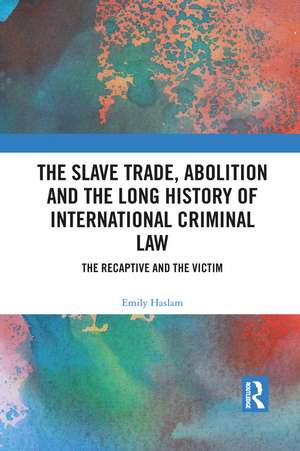The Slave Trade, Abolition and the Long History of International Criminal Law: The Recaptive and the Victim
Autor Emily Haslamen Limba Engleză Paperback – 30 iun 2021
By inscribing the recaptive in international criminal legal history, the book offers an original contribution to these contentious issues and a reflection on critical international criminal legal history writing and its accompanying methodological and political choices.
| Toate formatele și edițiile | Preț | Express |
|---|---|---|
| Paperback (1) | 380.40 lei 6-8 săpt. | |
| Taylor & Francis – 30 iun 2021 | 380.40 lei 6-8 săpt. | |
| Hardback (1) | 1000.27 lei 6-8 săpt. | |
| Taylor & Francis – 4 oct 2019 | 1000.27 lei 6-8 săpt. |
Preț: 380.40 lei
Nou
Puncte Express: 571
Preț estimativ în valută:
72.80€ • 79.05$ • 61.15£
72.80€ • 79.05$ • 61.15£
Carte tipărită la comandă
Livrare economică 22 aprilie-06 mai
Preluare comenzi: 021 569.72.76
Specificații
ISBN-13: 9781032088747
ISBN-10: 1032088745
Pagini: 156
Dimensiuni: 156 x 234 x 8 mm
Greutate: 0.23 kg
Ediția:1
Editura: Taylor & Francis
Colecția Routledge
Locul publicării:Oxford, United Kingdom
ISBN-10: 1032088745
Pagini: 156
Dimensiuni: 156 x 234 x 8 mm
Greutate: 0.23 kg
Ediția:1
Editura: Taylor & Francis
Colecția Routledge
Locul publicării:Oxford, United Kingdom
Public țintă
PostgraduateCuprins
1 Rethinking International Criminal Legal History;
2 Where It All Began: Prize;
3 The Piracy Analogy and the Slave Trade;
4 Mixed Commissions and the Expansion of Intervention;
5 After Seizure: The Hazards of Recaptivity;
6 Prize, Property and the Economies of Slave Trade Repression;
7 Back to the Present: Recaptives, Victims and Creditors;
8 Conclusion;
Notă biografică
Dr Emily Haslam is a Senior Lecturer in International Law at Kent Law School. Her research interests lie in the field of international criminal law, international legal history and civil society. She has extensive experience teaching international law, international criminal law and transnational criminal law.
Descriere
This book shows that efforts to deliver justice through international criminal law continue to face considerable challenges and raise testing questions about the construction – and alternative construction – of victims.
